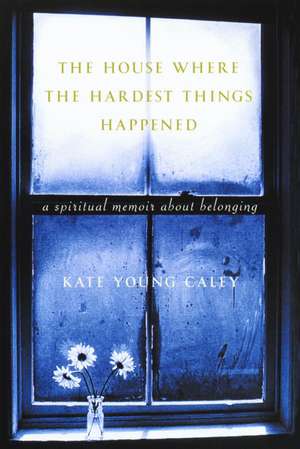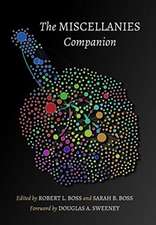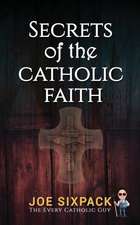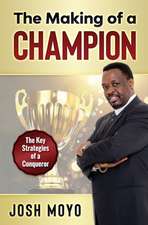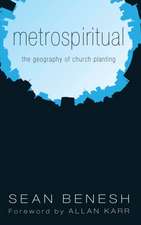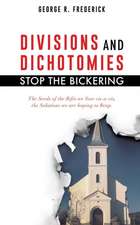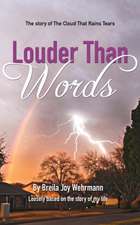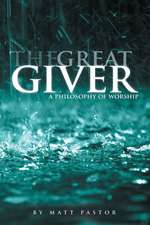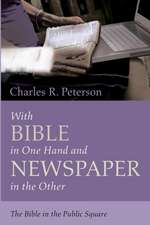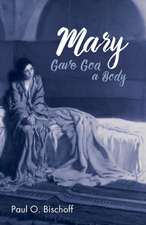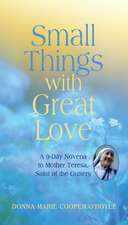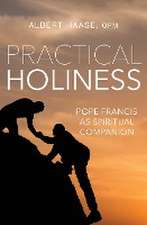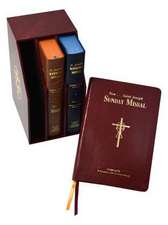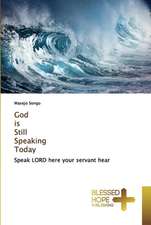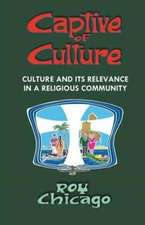The House Where the Hardest Things Happened: A Memoir about Belonging
Autor Kate Young Caleyen Limba Engleză Paperback – 30 noi 2003
Growing up in a small town in New Hampshire, Kate Young Caley attended a strong community church where everyone was treated like family, members selflessly helped one another, and all the kids were made to feel special. Then, suddenly, everything changed. Her father was hospitalized for many months and her mother was forced to take a job as a waitress to support the family. But the job required Kate’s mother to serve alcohol, which went against the church’s covenant, and the family, banned from attending services, soon found itself emotionally ostracized from the community.
In this compelling memoir, Kate Young Caley recounts the hurt and confusion she felt as a young girl, her subsequent questions concerning the Church, and her thoughtful and determined personal journey back to God. At once the story of a family profoundly transformed by tragedy and an incisive look at the meaning of God’s love, The House Where the Hardest Things Happened beautifully illustrates what it’s like to try and find God when you’ve been told you have no right to Him.
Preț: 110.11 lei
Nou
Puncte Express: 165
Preț estimativ în valută:
21.07€ • 21.97$ • 17.51£
21.07€ • 21.97$ • 17.51£
Carte tipărită la comandă
Livrare economică 17-24 martie
Preluare comenzi: 021 569.72.76
Specificații
ISBN-13: 9780877880738
ISBN-10: 0877880735
Pagini: 160
Dimensiuni: 140 x 210 x 12 mm
Greutate: 0.2 kg
Editura: Shaw Books
ISBN-10: 0877880735
Pagini: 160
Dimensiuni: 140 x 210 x 12 mm
Greutate: 0.2 kg
Editura: Shaw Books
Notă biografică
Kate Young Caley is a speaker and award-winning writer. She lives on a hill outside of Boston with her husband and their two daughters.
Extras
chapter one
When Everyone Loved Us
Brother Munroe is preaching. I am five years old and I am sitting in my favorite place: The First Church of God in Moultonboro, New Hampshire. He is talking about how important God's Book is to him. It's important to me too. We, in the primary department, are memorizing the names of the books of the New Testament and if I recite them all, Mrs. Nichols will give me a gold necklace that has a tiny glass bulb with a mustard seed inside. That tiny seed is like the kingdom of heaven--that's what Mrs. Nichols told us--and I want the necklace so I can figure out how this could be so.
I look up from the chair where I sit and see that Brother Munroe is crying again. He cries, my mother explains, because he really believes. Then he is shouting at us, "And if you don't feel this way, then you might as well throw the whole thing out the window right now!" And as he says the words he flings his Bible out into the congregation toward the window where Althea Buckley always sits.
Maybe it is only my imagination, but the Bible seems within inches of hitting me in the face as it flies by. I wait for the smashing of glass at the window, but there is none. Brother Munroe had tied a rope around his Bible, and just as it is about to smash the windowpanes he jerks the rope and whips the Bible back to him like a cowboy in a movie.
Thirty-five years later, that sermon illustration is still working its message in me. Part of the message I keep with me is that things can happen in a church you'll never be able to forget.
Back then, the sounds of Sunday mornings were sounds that meant everything was all right. That we were all together, cleaned and dressed up. My father in his tie and jacket, handsome as a movie star. My mother, all fancy in high heels that made little holes in the dirt lot where we parked our car, with a scented cloud of Shalimar following her up the stairs. When we walked into church, everybody loved us.
Old Miss Lynch sat at the donated piano and plunked accompaniment to our love for God and each other. How could we not be moved by the towering promises of those gospel hymns? We knew every word to "There Is Power in the Blood" and "Blessed Assurance Jesus Is Mine." My parents' voices harmonized above me as I stood between them and they sang my favorite words, "My sheep know my voice . . . no danger nor harm will touch one of them, for I will be with them always." My father's voice was so deep I could feel it in my stomach and my mother's voice blended so exactly with his, you had to believe God created them only for each other.
I remember the sound of shuffling feet and scraping chairs against the cement floor as we sat down to listen to the day's sermon. Brother Henry, behind me, would pull out a butterscotch hard candy and slowly untwist the stiff cellophane. And this would remind me that I, too, was hungry and in need of diversion. I'd muffle the snap of the little metal clasp on my mother's handbag and look for my favorite--a box of pink Canada Mints. Usually, I would have to settle for a lint-covered Tums that I'd suck silently as Brother Munroe preached about redemption. I remember the sound of his fist hitting the pulpit and then the quiet, slow turn of the tissue-thin pages of his Bible that lay open in his hand, as limp as a dead hen.
As the sermon came to a close, old Miss Lynch would begin a strain of a sad song, so softly you'd barely notice at first. One or two would begin singing. A few more. Then all of us would join in on the songs that called us Home.
Every Sunday was the same. And there was such grace in sameness. But all that was before they kicked us out.
chapter two
The Complication
My mother had just delivered our baby brother, and was still bleeding the birthing blood. She seemed to cry a lot. My older brother was eight years old. I was five. And one night, my Dad did not come home.
At midnight we still hadn't heard a thing. Was he alive? Had he left us for good like the husband across the street? Did he need us and wonder why we didn't come to help? That possibility made me cry the hardest.
The next morning neighbors and friends crowded our kitchen with cups of tea and plates of sandwiches. Long distance calls were placed to Nana, my father's mother. To aunts and uncles. Another day went by. Another night. There was lots of crying and there were hushed voices and words whose meanings I did not understand, but could imagine well enough. Someone sat at the piano and played hymns. They were so achingly familiar I could hear my father's harmony in them.
I remember I sat on my parents' bed because it smelled like them. I played with my dolls, dressing and re-dressing them; taking care of them the way I wished someone would take care of me. It was three days before we heard anything.
Amnesia. That's what the doctors called it. In February of 1965, my Dad had reported for duty to his base in Biloxi, Mississippi, certain it was 1954 and he was still in the army. They could not convince him otherwise.
"A breakdown," that's what the ladies in the kitchen whispered as they shook their heads. "It's been too much for him."
Within the last couple of years my father's younger brother had committed suicide and their father had died of a stroke. My Dad found a lump on his neck one morning while he was shaving but didn't dare to tell anyone. If you don't tell anyone about it, maybe it isn't even there.
But eventually he took himself to the doctor and when the follow-up call came, the test results were not good. The pain that had been troubling him in his throat was cancer. They told him to get his wife and come in, right away. Instead, he pawned his favorite guitar for cash, parked his truck at the bus depot, and bought a ticket to Biloxi.
Years later, my Dad told me that the strangest moment of his entire life was when the commanding officer of the base held up the front page of the daily newspaper to prove to him, after many failed attempts, the day and year it really was. My Dad said he kept looking at that date, trying to figure out how they did the joke.
He looked up at me, as I sat across from him waiting for the rest of the story. He shook his head, smiled his handsome smile, and shrugged as if he still couldn't figure it out.
When he had finally called my mother, he was sitting in the base sergeant's office. A doctor had been brought in, a couple of MPs. Someone had to come and get him, he told her. He asked if the kids were okay.
My mother asked, "You remember us, Dick?" and he said, "June, don't be ridiculous." When she got off the phone, she could not stop crying.
I realize now, how particularly young my mother was when all this happened. She was slender and small. Twenty-nine years old. She loved movie magazines and pretty bathrobes. When she vacuumed the rugs, she played her Patsy Cline record up loud and smoked a cigarette and danced the stroll as she pulled the canister across the room.
My father had talked her into eloping with him and moving from the city, where all her aunts and uncles had settled from Prince Edward Island, to a little town where she didn't know anyone. Eight years later, she was still homesick. And now he was gone.
She took weak bites of the little sandwiches the church ladies handed her, imploring her to keep up her strength for the children. My mother's mother arrived. Neighbors brought more food. We all waited together.
Uncle Frannie and Uncle George drove to Mississippi to bring my father back to us. But it didn't turn out to be so simple.
Nana, my father's mother, had made arrangements for him to be admitted to a state mental hospital near where she lived in the city. She implied the trouble was all my mother's fault. The doctor insisted my mother sign the papers to admit my father. My father cried and begged her not to do it. The doctor said there was no choice. What else could my mother do?
Could she have said, "Nana, do you know the real trouble? That he only stutters when he is with you? That he has to stop the car and throw up before we get to your house, Nana--your house with all that fine, family silver?"
But my mother was not that way. And now it's too late. So many of them are gone. The doctor. Nana. My Dad. So what does it matter? Still, I ask my questions to try to understand what happened to us back then. And my mother tries to answer. We work at it. And when the words are hard to find, we wait. It's work she understands I have to do.
chapter three
After The First Church of God
After the time he spent in the psychiatric ward, my Dad was treated for his cancer at the Veteran's Administration Hospital in White River Junction, near the border between New Hampshire and Vermont. In those days, people with cancer were hospitalized for months. We drove each Sunday afternoon over the winding roads in our unreliable car that pumped exhaust into the back seat and made our stomachs and heads hurt. It was a long ride for my brothers and me, who sat, tired and cranky, cramped together.
When we finally got to him each week, my father was not the same man we knew. He was quiet. He was thin. He seemed more comfortable among pale men in faded johnnies playing sad hands of solitaire than he did with us. His neck was burned from radiation. That redness never did fade.
Ultimately, though, the cancer treatments worked and my father came back to us. He was shaky and weak, and so were we really; but when we tell the story of those years, we always end with this: He was the only man on his ward who lived.
And though he survived when the doctors said he would die--causing us to confuse him slightly, but forever, with that other immortal, invincible Father we revered--we never did get our old life back. That one I had loved, where my Dad had just become a minister of the church. Where he stood in the pulpit preaching with his deep voice. And I sat proudly in the front row.
Over the months he was away from us in the hospital, my mother had taken a job as a waitress. It was the best job she could find in our small town, serving dinner in a fancy place that catered to the tourists who owned expensive property on the nearby lakes. My mother was friendly. The tips were good. But when word spread to The First Church of God, there was trouble.
The problem was this: my mother was serving alcohol and though she didn't drink herself, that wasn't the point. When my father got out of the hospital, a meeting was called. My parents sat in their usual pew. A vote of the congregation was taken. Hands raised in vote all around them. The numbers were clear. June Young had broken the covenant. She had to leave. And my father walked out the door with her.
Because she thought it the right thing to do, my mother still dropped my older brother and me off at Sunday school each week, waiting in the car while we learned our Bible stories. She didn't want us to have to miss out on church just because she couldn't be there.
Then one morning my teacher told the class that my mother was a bad woman. She used her as an example of sin for our lesson that day. I remember asking my mother, "What does hypocrite mean?" She couldn't find a way to answer. I started to cry. She set her jaw. That was the last Sunday we went.
And so I, who loved church--who was so close to having memorized the names of all the books of the New Testament, so close to earning the mustard seed necklace and the kingdom of heaven, itself--I too was out.
Over the years I would sometimes ask my father, "So what was it, exactly, that happened?"
And my father would say, "We broke the covenant. They voted us out." And the way he said it--short answer, deep voice, heavy, certain punctuation--made it sound like that was a sufficient explanation. Covenant. Voted. Out. It was never enough for me, that answer. But I didn't know how to get any other.
I remember that covenant. It stated the rules that church members had to agree to abide by. It was written on a muslin cloth that hung behind the pulpit. There were big Roman numerals and words stenciled with heavy black paint. Certain words were done with red paint to make them stand out, but since I could not yet read, I did not know why. I only knew that there were words on that muslin cloth that made it okay to make my mother cry. And to make me cry too.
A few months after we got kicked out, I was standing in the bread aisle at Ellen's General Store. I was looking up and down the shelf for the bright colors of our favorite brand and as I turned the corner, I looked right in the face of my Sunday school teacher, Mrs. Esther Nichols. She blushed. And with a slight tremor of--what was it--embarrassment? Disgust? (Might it have been shame?) She turned and walked away.
What had just happened? I had almost said hello. Smiled. I did not yet understand that I was not supposed to be glad to see her. And then I was afraid that someone else might have seen her turning away from me. Might agree with it even. And soon, no one in town would speak to me. Not even the ones who thought church was a waste of time.
I wondered if Mrs. Nichols was still in the store. Had I just heard her voice at the cash register saying something to the owner? I wanted to go to my mother, but to do that meant I had to walk past Mrs. Nichols.
From the Hardcover edition.
When Everyone Loved Us
Brother Munroe is preaching. I am five years old and I am sitting in my favorite place: The First Church of God in Moultonboro, New Hampshire. He is talking about how important God's Book is to him. It's important to me too. We, in the primary department, are memorizing the names of the books of the New Testament and if I recite them all, Mrs. Nichols will give me a gold necklace that has a tiny glass bulb with a mustard seed inside. That tiny seed is like the kingdom of heaven--that's what Mrs. Nichols told us--and I want the necklace so I can figure out how this could be so.
I look up from the chair where I sit and see that Brother Munroe is crying again. He cries, my mother explains, because he really believes. Then he is shouting at us, "And if you don't feel this way, then you might as well throw the whole thing out the window right now!" And as he says the words he flings his Bible out into the congregation toward the window where Althea Buckley always sits.
Maybe it is only my imagination, but the Bible seems within inches of hitting me in the face as it flies by. I wait for the smashing of glass at the window, but there is none. Brother Munroe had tied a rope around his Bible, and just as it is about to smash the windowpanes he jerks the rope and whips the Bible back to him like a cowboy in a movie.
Thirty-five years later, that sermon illustration is still working its message in me. Part of the message I keep with me is that things can happen in a church you'll never be able to forget.
Back then, the sounds of Sunday mornings were sounds that meant everything was all right. That we were all together, cleaned and dressed up. My father in his tie and jacket, handsome as a movie star. My mother, all fancy in high heels that made little holes in the dirt lot where we parked our car, with a scented cloud of Shalimar following her up the stairs. When we walked into church, everybody loved us.
Old Miss Lynch sat at the donated piano and plunked accompaniment to our love for God and each other. How could we not be moved by the towering promises of those gospel hymns? We knew every word to "There Is Power in the Blood" and "Blessed Assurance Jesus Is Mine." My parents' voices harmonized above me as I stood between them and they sang my favorite words, "My sheep know my voice . . . no danger nor harm will touch one of them, for I will be with them always." My father's voice was so deep I could feel it in my stomach and my mother's voice blended so exactly with his, you had to believe God created them only for each other.
I remember the sound of shuffling feet and scraping chairs against the cement floor as we sat down to listen to the day's sermon. Brother Henry, behind me, would pull out a butterscotch hard candy and slowly untwist the stiff cellophane. And this would remind me that I, too, was hungry and in need of diversion. I'd muffle the snap of the little metal clasp on my mother's handbag and look for my favorite--a box of pink Canada Mints. Usually, I would have to settle for a lint-covered Tums that I'd suck silently as Brother Munroe preached about redemption. I remember the sound of his fist hitting the pulpit and then the quiet, slow turn of the tissue-thin pages of his Bible that lay open in his hand, as limp as a dead hen.
As the sermon came to a close, old Miss Lynch would begin a strain of a sad song, so softly you'd barely notice at first. One or two would begin singing. A few more. Then all of us would join in on the songs that called us Home.
Every Sunday was the same. And there was such grace in sameness. But all that was before they kicked us out.
chapter two
The Complication
My mother had just delivered our baby brother, and was still bleeding the birthing blood. She seemed to cry a lot. My older brother was eight years old. I was five. And one night, my Dad did not come home.
At midnight we still hadn't heard a thing. Was he alive? Had he left us for good like the husband across the street? Did he need us and wonder why we didn't come to help? That possibility made me cry the hardest.
The next morning neighbors and friends crowded our kitchen with cups of tea and plates of sandwiches. Long distance calls were placed to Nana, my father's mother. To aunts and uncles. Another day went by. Another night. There was lots of crying and there were hushed voices and words whose meanings I did not understand, but could imagine well enough. Someone sat at the piano and played hymns. They were so achingly familiar I could hear my father's harmony in them.
I remember I sat on my parents' bed because it smelled like them. I played with my dolls, dressing and re-dressing them; taking care of them the way I wished someone would take care of me. It was three days before we heard anything.
Amnesia. That's what the doctors called it. In February of 1965, my Dad had reported for duty to his base in Biloxi, Mississippi, certain it was 1954 and he was still in the army. They could not convince him otherwise.
"A breakdown," that's what the ladies in the kitchen whispered as they shook their heads. "It's been too much for him."
Within the last couple of years my father's younger brother had committed suicide and their father had died of a stroke. My Dad found a lump on his neck one morning while he was shaving but didn't dare to tell anyone. If you don't tell anyone about it, maybe it isn't even there.
But eventually he took himself to the doctor and when the follow-up call came, the test results were not good. The pain that had been troubling him in his throat was cancer. They told him to get his wife and come in, right away. Instead, he pawned his favorite guitar for cash, parked his truck at the bus depot, and bought a ticket to Biloxi.
Years later, my Dad told me that the strangest moment of his entire life was when the commanding officer of the base held up the front page of the daily newspaper to prove to him, after many failed attempts, the day and year it really was. My Dad said he kept looking at that date, trying to figure out how they did the joke.
He looked up at me, as I sat across from him waiting for the rest of the story. He shook his head, smiled his handsome smile, and shrugged as if he still couldn't figure it out.
When he had finally called my mother, he was sitting in the base sergeant's office. A doctor had been brought in, a couple of MPs. Someone had to come and get him, he told her. He asked if the kids were okay.
My mother asked, "You remember us, Dick?" and he said, "June, don't be ridiculous." When she got off the phone, she could not stop crying.
I realize now, how particularly young my mother was when all this happened. She was slender and small. Twenty-nine years old. She loved movie magazines and pretty bathrobes. When she vacuumed the rugs, she played her Patsy Cline record up loud and smoked a cigarette and danced the stroll as she pulled the canister across the room.
My father had talked her into eloping with him and moving from the city, where all her aunts and uncles had settled from Prince Edward Island, to a little town where she didn't know anyone. Eight years later, she was still homesick. And now he was gone.
She took weak bites of the little sandwiches the church ladies handed her, imploring her to keep up her strength for the children. My mother's mother arrived. Neighbors brought more food. We all waited together.
Uncle Frannie and Uncle George drove to Mississippi to bring my father back to us. But it didn't turn out to be so simple.
Nana, my father's mother, had made arrangements for him to be admitted to a state mental hospital near where she lived in the city. She implied the trouble was all my mother's fault. The doctor insisted my mother sign the papers to admit my father. My father cried and begged her not to do it. The doctor said there was no choice. What else could my mother do?
Could she have said, "Nana, do you know the real trouble? That he only stutters when he is with you? That he has to stop the car and throw up before we get to your house, Nana--your house with all that fine, family silver?"
But my mother was not that way. And now it's too late. So many of them are gone. The doctor. Nana. My Dad. So what does it matter? Still, I ask my questions to try to understand what happened to us back then. And my mother tries to answer. We work at it. And when the words are hard to find, we wait. It's work she understands I have to do.
chapter three
After The First Church of God
After the time he spent in the psychiatric ward, my Dad was treated for his cancer at the Veteran's Administration Hospital in White River Junction, near the border between New Hampshire and Vermont. In those days, people with cancer were hospitalized for months. We drove each Sunday afternoon over the winding roads in our unreliable car that pumped exhaust into the back seat and made our stomachs and heads hurt. It was a long ride for my brothers and me, who sat, tired and cranky, cramped together.
When we finally got to him each week, my father was not the same man we knew. He was quiet. He was thin. He seemed more comfortable among pale men in faded johnnies playing sad hands of solitaire than he did with us. His neck was burned from radiation. That redness never did fade.
Ultimately, though, the cancer treatments worked and my father came back to us. He was shaky and weak, and so were we really; but when we tell the story of those years, we always end with this: He was the only man on his ward who lived.
And though he survived when the doctors said he would die--causing us to confuse him slightly, but forever, with that other immortal, invincible Father we revered--we never did get our old life back. That one I had loved, where my Dad had just become a minister of the church. Where he stood in the pulpit preaching with his deep voice. And I sat proudly in the front row.
Over the months he was away from us in the hospital, my mother had taken a job as a waitress. It was the best job she could find in our small town, serving dinner in a fancy place that catered to the tourists who owned expensive property on the nearby lakes. My mother was friendly. The tips were good. But when word spread to The First Church of God, there was trouble.
The problem was this: my mother was serving alcohol and though she didn't drink herself, that wasn't the point. When my father got out of the hospital, a meeting was called. My parents sat in their usual pew. A vote of the congregation was taken. Hands raised in vote all around them. The numbers were clear. June Young had broken the covenant. She had to leave. And my father walked out the door with her.
Because she thought it the right thing to do, my mother still dropped my older brother and me off at Sunday school each week, waiting in the car while we learned our Bible stories. She didn't want us to have to miss out on church just because she couldn't be there.
Then one morning my teacher told the class that my mother was a bad woman. She used her as an example of sin for our lesson that day. I remember asking my mother, "What does hypocrite mean?" She couldn't find a way to answer. I started to cry. She set her jaw. That was the last Sunday we went.
And so I, who loved church--who was so close to having memorized the names of all the books of the New Testament, so close to earning the mustard seed necklace and the kingdom of heaven, itself--I too was out.
Over the years I would sometimes ask my father, "So what was it, exactly, that happened?"
And my father would say, "We broke the covenant. They voted us out." And the way he said it--short answer, deep voice, heavy, certain punctuation--made it sound like that was a sufficient explanation. Covenant. Voted. Out. It was never enough for me, that answer. But I didn't know how to get any other.
I remember that covenant. It stated the rules that church members had to agree to abide by. It was written on a muslin cloth that hung behind the pulpit. There were big Roman numerals and words stenciled with heavy black paint. Certain words were done with red paint to make them stand out, but since I could not yet read, I did not know why. I only knew that there were words on that muslin cloth that made it okay to make my mother cry. And to make me cry too.
A few months after we got kicked out, I was standing in the bread aisle at Ellen's General Store. I was looking up and down the shelf for the bright colors of our favorite brand and as I turned the corner, I looked right in the face of my Sunday school teacher, Mrs. Esther Nichols. She blushed. And with a slight tremor of--what was it--embarrassment? Disgust? (Might it have been shame?) She turned and walked away.
What had just happened? I had almost said hello. Smiled. I did not yet understand that I was not supposed to be glad to see her. And then I was afraid that someone else might have seen her turning away from me. Might agree with it even. And soon, no one in town would speak to me. Not even the ones who thought church was a waste of time.
I wondered if Mrs. Nichols was still in the store. Had I just heard her voice at the cash register saying something to the owner? I wanted to go to my mother, but to do that meant I had to walk past Mrs. Nichols.
From the Hardcover edition.
Recenzii
“Many centuries ago, St. Augustine wrote that our hearts are restless until they come to rest in God. Kate Caley’s memoir is a priceless study of both the restlessness and the rest.”
–Lauren Winner, author of Girl Meets God
“This is the story of a loving family in a dysfunctional world. Wounded outrageously by their church, the Youngs never lose faith. Up to their necks in hard work and hard times, they remain hopeful, adventurous, sweetly eccentric. Their daughter’s thoughtful, affectionate reflections make a wonderful tribute.”
–Betty Smartt Carter, novelist and author of Home Is Always the Place You Just Left
“A tender, thoughtful exploration of the life of a family with more than its share of suffering, in clear and exquisite writing. This spiritual memoir should appeal to anyone who has struggled with the damage that church can do to faith.”
–Molly Wolf, author of Angels and Dragons
“The House Where the Hardest Things Happened teaches us, moves us, challenges us in our hypocrisy and exclusivism in God’s name. It is an exquisitely described journey, a pilgrimage toward a spiritual home.… It is a celebration of life in the midst of loss. It is a testimony to God’s redemptive love and faithfulness. It is an accessible lesson in advanced spirituality.”
–Louis J. Mitchell, Th.D., Presbyterian pastor and pastor/theologian, Center of Theological Inquiry, Princeton, New Jersey
“A thoughtful, luminous addition to the literature of faith.”
–Kirkus Reviews
–Lauren Winner, author of Girl Meets God
“This is the story of a loving family in a dysfunctional world. Wounded outrageously by their church, the Youngs never lose faith. Up to their necks in hard work and hard times, they remain hopeful, adventurous, sweetly eccentric. Their daughter’s thoughtful, affectionate reflections make a wonderful tribute.”
–Betty Smartt Carter, novelist and author of Home Is Always the Place You Just Left
“A tender, thoughtful exploration of the life of a family with more than its share of suffering, in clear and exquisite writing. This spiritual memoir should appeal to anyone who has struggled with the damage that church can do to faith.”
–Molly Wolf, author of Angels and Dragons
“The House Where the Hardest Things Happened teaches us, moves us, challenges us in our hypocrisy and exclusivism in God’s name. It is an exquisitely described journey, a pilgrimage toward a spiritual home.… It is a celebration of life in the midst of loss. It is a testimony to God’s redemptive love and faithfulness. It is an accessible lesson in advanced spirituality.”
–Louis J. Mitchell, Th.D., Presbyterian pastor and pastor/theologian, Center of Theological Inquiry, Princeton, New Jersey
“A thoughtful, luminous addition to the literature of faith.”
–Kirkus Reviews
